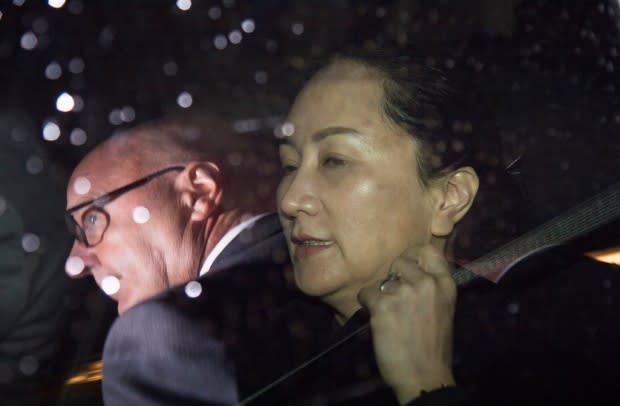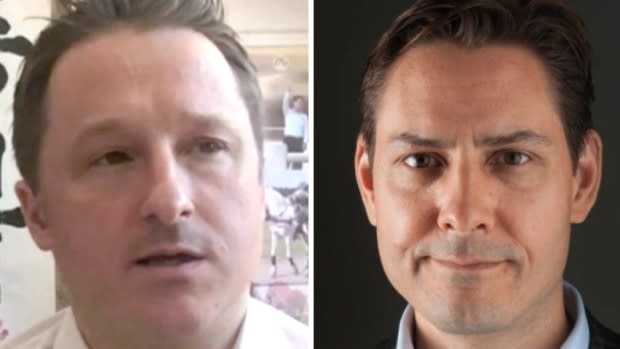Meng Wanzhou lawyers claim Trump has 'poisoned' extradition proceedings
Lawyers for Meng Wanzhou claim U.S. President Donald Trump has "poisoned" extradition proceedings against the Huawei executive to the degree where the judge overseeing the hearing has no choice but to throw the case out.
In court documents filed in advance of a September hearing, Meng's defence team cites Trump's history of intervening in high-profile criminal cases to claim he would have no hesitation to make good on his threat to use their client as a bargaining chip in a global trade war.
Lawyers for the Huawei chief financial officer also noted Prime Minister Justin Trudeau's comments about two Canadians detained in China in apparent retaliation for Meng's arrest.
The lawyers claim Meng, 48, has been left in the impossible position of fearing that any attempt to defend herself may affect either the Chinese economy or the lives of two men.
"These proceedings have been poisoned," Meng's lawyers claimed in a 28-page legal brief outlining their arguments.
"They can no longer be reasonably regarded as fair, regardless of the undoubted good faith of the court."
Trump says he would 'certainly intervene'
Meng was arrested on an extradition warrant on Dec. 1, 2018, after landing in Vancouver on what was supposed to be a layover between Hong Kong and Mexico City.
The U.S. wants to extradite Meng to New York to face charges of fraud and conspiracy.
She is accused of lying to banks about Huawei's relationship with a company accused of violating U.S. economic sanctions against Iran. Prosecutors claim Meng's alleged lies placed banks at risk of loss and prosecution.

The latest legal arguments are grounded in a statement Trump made to a reporter less than two weeks after Meng's arrest in which he was asked if he would intervene in the case. At the time, the United States had recently escalated the trade war with China, which is still in effect.
"If I think it's good for what will be certainly the largest trade deal ever made — which is a very important thing — what's good for national security, I would certainly intervene if I thought it was necessary," Trump replied.
Meng's lawyers say the actions of the president and U.S. Attorney General William Barr in the cases of both Trump's former National Security Advisor Michael Flynn and his political advisor Roger Stone make clear that his words are not just idle talk.
Flynn — who Trump called "a good guy" — pleaded guilty twice to lying to the Federal Bureau of Investigation about conversations with Russia's ambassador, yet the case against him was dismissed after the U.S. Justice Department intervened.

In February, Trump demanded a new trial for Stone, calling himself "the chief law enforcement officer of the country." More recently, he acted to commute Stone's three year prison sentence for witness tampering and lying to Congress.
"The two examples show that the (U.S.) president not only thinks he can intervene in prosecutions, but that he will do so when it suits his political agenda," Meng's lawyers wrote.
They also said that Trump has already said that "there is MUCH more to come" when it comes to interventions.
The fate of two Canadians
The court documents also claim Trudeau contributed to the politicization of the case in statements he made to a French language TV show in December 2019 with regard to former diplomat Michael Kovrig and entrepreneur Michael Spavor.
The two were detained in China within days of Meng's arrest and have since been accused of spying. Both men have been held in Chinese prisons for more than a year and a half.

Trudeau claimed his government told the U.S. it "should not sign a final and complete agreement with China that does not settle the question of Meng Wanzhou and the two Canadians."
"As a bargaining chip in a global trade war, (Meng faces) intimidation regarding the ramifications her own decisions may have on others," her lawyers claim.
They say a reasonable person would believe that how Meng "defends her extradition could alter the consequences faced by the two Canadians held in China.
Her defence strategy could also impact Huawei in its future interests as a globally competitive company, as well as Canada's economy."
Meng's lawyers allege abuse of process
The legal arguments are all part of a series of attempts that the defence plans to make to have the case against Meng tossed for alleged abuse of process.
The same newly filed batch of court documents include an argument that the U.S. failed to disclose material facts in its record of the case that show Meng's statements to banks had no impact on the financial decisions in question.
If necessary, the defence team also plans to argue that Canadian and U.S. authorities conspired to violate Meng's Constitutional rights at the time of her arrest.
To that end, her lawyers will be in federal court next week to argue for the release of Canadian Security Intelligence Service documents that they claim prove collusion with the FBI.
CSIS has already released a number of heavily redacted documents suggesting that it was aware of Meng's arrest and in contact with the FBI and other agencies.
Canada's attorney general claims the redacted information should be kept from public view because of national security concerns. Affidavits filed in the case suggest that the details could inflame tensions with China and alienate intelligence sources.
But in federal court documents released Friday, Meng's lawyers claim the information could be crucial to her defence.
"If there is additional information hidden under the redactions ... national security privilege should not be used to cover up the abuse," the lawyers state.
"Additionally, national security privilege should not be used to protect government enforcement officials from being embarrassed."
Meng has been living under house arrest since her release on $10 million bail in the week after her initial arrest.
She wears a monitoring bracelet as part of her release conditions and lives in one of two multi-million mansions she owns on Vancouver's west side.
She has denied the allegations made against her.


